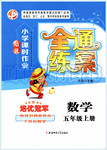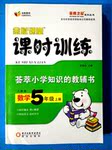题目内容
She wore , _____ was very uncommon in the country, a red garment.
| A.what | B.which | C.of which | D.as |
B
解析试题分析:考察非限制性定语从句。本题把定语从句放在句中,先行词是a red garment,which指代前面一句话的内容在非限制性定语从句中作主语。句意:她穿着一件红衣服,这在这个国家是很罕见的事情。What不能引导非限制性定语从句,C项不能再句中作主语。As有正如的意思。故B正确。
考点:考察非限制性定语从句
点评:非限定性定语从句起补充说明作用,缺少也不会影响全句的理解,在非限定性定语从句的前面往往有逗号隔开,如若将非限定性定语从句放在句子中间,起前后都需要用逗号隔开。需要注意 which引导的非限定性定语从句是用来说明前面整个句子的情况或主句的某一部分。 在非限定性定语从句中,关系词不能用that。

 小学课时作业全通练案系列答案
小学课时作业全通练案系列答案 金版课堂课时训练系列答案
金版课堂课时训练系列答案 单元全能练考卷系列答案
单元全能练考卷系列答案 新黄冈兵法密卷系列答案
新黄冈兵法密卷系列答案
We may look at the world around us, but somehow we manage not to see it until whatever we've become used to suddenly disappears. 36 , for example, the neatly-dressed woman I 37 to see -- or look at -- on my way to work each morning.
For three years, no matter 38 the weather was like, she was always waiting at the bus stop around 8:00 am. On 39 days, she wore heavy clothes and a pair of woolen gloves. Summertime 40 out neat, belted cotton dresses and a hat pulled low over her sunglasses. 41 , she was an ordinary working woman. Of course, I 42 all this only after she was seen no more. It was then that I realized how 43 I expected to see her each morning. You might say I 44 her.
“Did she have an accident? Something 45 ?” I thought to myself about her 46 . Now that she was gone, I felt I had 47 her. I began to realize that part of our 48 life probably includes such chance meetings with familiar 49 : the milkman you see at dawn, the woman who 50 walks her dog along the street every morning, the twin brothers you see at the library. Such people are 51 markers in our lives. They add weight to our 52 of place and belonging.
Think about it. 53 , while walking to work, we mark where we are by 54 a certain building, why should we not mark where we are when we pass a familiar, though 55 , person
36. A. Make | B. Take | C. Give | D. Have |
37. A. happened | B. wanted | C. used | D. tried |
38. A. what | B. how | C. which | D. when |
39. A. sunny | B. rainy | C. cloudy | D. snowy |
40. A. took | B. brought | C. carried | D. turned |
41. A. Clearly | B. Particularly | C. Luckily | D. Especially |
42. A. believed | B. expressed | C. remembered | D. wondered |
43. A. long | B. often | C. soon | D. much |
44. A. respected | B. missed | C. praised | D. admired |
45. A. better | B. worse | C. more | D. less |
46. A. disappearance | B. appearance | C. misfortune | D. fortune |
47. A. forgotten | B. lost | C. known | D. hurt |
48. A. happy | B. enjoyable | C. frequent | D. daily |
49. A. friends | B. strangers | C. tourists | D. guests |
50. A. regularly | B. actually | C. hardly | D. probably |
51. A. common | B. pleasant | C. important | D. faithful |
52. A. choice | B. knowledge | C. decision | D. sense |
53. A. Because | B. If | C. Although | D. However |
54. A. keeping | B. changing | C. passing | D. mentioning |
55. A. unnamed | B. unforgettable | C. unbelievable | D. unreal |
I stood outside New York's Madison Square Garden and just stared, almost speechless. I was a farm boy from County Kilkenny, a child who some thought would never walk, let alone go as far as I had in the world.
From the day I was born, there was a problem. The doctors at the Dublin hospital told my parents I had phocomelia, a deformity that affected both legs below the knee, which were outward and shorter than normal and each foot had just three toes.
Life was tough. I couldn't stand, much less walk. I rarely, left the farmhouse---and then only in someone's arms. Mam bundled me up whenever she took me to town, no matter the season.
“The world will see him when he can walk,” she told Dad. “And he will walk.”
Mam devoted herself to helping me. She tried everything to get me on my feet. When I was three, she and Dad took me to a clinic in Dublin.
A few weeks later we returned to Dublin with my artificial limbs (肢). Back home I practiced walking with my new limbs.
“There's nothing anyone can do but you can't,” Mam said. “You and I are going to walk through town.”
The next day Mam dressed me in my finest clothes. She wore a summer dress and fixed her hair and makeup. Dad drove us to the church. We stepped out of the car. Mam took my hand. “Hold your head up high, now, Ronan,” she said.
We walked 300 meters to the post office. It was the farthest I'd walked, and I was sweating from the effort. Then we left the post office and continued down the street, Mam's eyes shining with a mother's pride.
That night, back on our farm, I lay exhausted on my bed. It meant nothing, though, compared to what I'd done on my walk.
Then I began to pursue my dream of singing. And at every step Mam's words came back to me—Ronan, you can do anything anyone else can do—and the faith she had in God, who would help me do it.
I've sung from the grandest stages in Europe, to music played by the world's finest musicians. That night, I stood at the Madison Square Garden, with Mam's words chiming in my ears. Then I began singing. I couldn't feel the pulse of the music in my feet, but I felt it deep in my heart, the same place where Mam's promise lived.
【小题1】What was the problem with the author as a baby?
| A.He was expected unable to walk. |
| B.He was born outward in character. |
| C.He had a problem with listening. |
| D.He was shorter than a normal baby. |
| A.shortcoming | B.disadvantage | C.disability | D.delay |
| A.To hide their depressed feeling. |
| B.To indicate it an unusual day. |
| C.To show off their clothes. |
| D.To celebrate his successful operation. |
| A.determined | B.stubborn | C.generous | D.distinguished |
| A.His consistent effort. | B.His talent for music. |
| C.His countless failures. | D.His mother's promise. |
I stood outside New York’s Madison Square Garden and just stared, almost speechless. I was a farm boy from County Kilkenny, a child who some thought would never walk, let alone go as far as I had in the world.
From the day I was born, there was a problem. The doctors at the Dublin hospital told my parents I had phocomelia, a deformity that affected both legs below the knee, which were outward and shorter than normal and each foot had just three toes.  Life was tough. I couldn’t stand, much less walk. I rarely left the farmhouse—and then only in someone’s arms. Mom bundled me up whenever she took me to town, no matter the season.
Life was tough. I couldn’t stand, much less walk. I rarely left the farmhouse—and then only in someone’s arms. Mom bundled me up whenever she took me to town, no matter the season.
“The world will see him when he can walk,” she told Dad. “And he will walk.”
Mom devoted herself to helping me. She tried everything to get me on my feet. When I was three, she and Dad took me to a clinic in Dublin.
A few weeks later we returned to Dublin with my artificial limbs (肢). Back home I practiced walking with my new limbs.
“There’s nothing anyone can do but you can’t,” Mom said. “You and I are going to walk through town.”
The next day Mom dressed me in my finest clothes. She wore a summer dress and fixed her hair and makeup. Dad drove us to the church. We stepped out of the car. Mom took my hand. “Hold your head up high, now, Ronan,” she said.
We walked 300 meters to the post office. It was the farthest I’d walked, and I was sweating from the effort. Then we left the post office and continued down the street, Mom's eyes shining with a mother's pride.
That night, back on our farm, I lay exhausted on my bed. It meant nothing, though, compared to what I’d done on my walk.
Then I began to pursue my dream of singing. And at every step Mom's words came back to me—Ronan, you can do anything anyone else can do—and the faith she had in God, who would help me do it.
I’ve sung from the grandest stages in Europe, to music played by the world’s finest musicians. That night, I stood at the Madison Square Garden, with Mom’s words chiming in my ears. Then I began singing. I couldn't feel the pulse of the music in my feet, but I felt it deep in my heart, the same place where Mom’s promise lived. 
【小题1】What was the problem with the author as a baby?
| A.He was expected unable to walk. |
| B.He was born outward in character. |
| C.He had a problem with listening. |
D.He was shorter than a normal baby. |
| A.shortcoming | B.disadvantage |
| C.disability | D.delay |
| A.To hide their depressed feeling. |
| B.To indicate it an unusual day. |
| C.To show off their clothes. |
D.To celebrate his successful operation. |
| A.determined | B.stubborn | C.generous | D.distinguished |
 【小题5】According to the writer, what mattered most in his success?
【小题5】According to the writer, what mattered most in his success? | A.His consistent effort. | B.His talent for music. |
| C.His countless failures. | D.His mother’s promise. |
When I was in primary school, sometimes I would meet a girl of the same age as me. Lisa was never active, but she was always very sweet and nice. In the 5th grade she came to my class.
She was absent(缺席) a lot , and one day I had the courage to ask why. She told me she was sick, and she explained she wore a wig(假发) because her medicine made her lose her hair. We left it at that. Anytime Lisa came to class—seldom—I would hang around with her on the playground.
I received much ridicule (嘲笑) from my friends for this because they thought I was ignoring them for Lisa. My family education taught me to be nice, and I felt Lisa’s needs were much more important than others I knew.
It had been months since Lisa was in our class, and one day our teacher was crying. She explained Lisa died the day before and would no longer be our classmate. She told us Lisa had fought a battle (斗争)with cancer for years.
I was shocked. Lisa never spoke of her illness as if it could kill her. Well, all these years I have kept Lisa in my mind and heart. When I go through the important events in my life, I think of Lisa.
I’ve had a strong wish recently to find her mother and father. I’d like to tell them that though they never met me, their daughter had a sweet effect on my life. I have no idea what her parents’ first names are. I write to your column (栏目)and hope you can point me in the right direction.
Lisa was such a lovely girl. Maybe her parents would be comforted by the fact that after all these years they are not the only ones who remember her.
【小题1】The underlined sentence in Para 2 probably means ________________.
| A.we discussed the topic and then left together |
| B.we just stopped talking about her illness |
| C.we went away after talking about her illness |
| D.we kept on talking about her illness later |
| A.Because she lost her friends because of Lisa. |
| B.Because she wore a wig to school. |
| C.Because she cried in the classroom. |
| D.Because she always played with Lisa. |
| A.To put others’ needs above yours. | B.To keep your illness a secret. |
| C.To be nice to everyone everywhere. | D.To face challenges in life bravely. |
| A.ask for help to find a friend’s parents | B.remember a true friend |
| C.tell her experience of fighting cancer | D.show her concern for a friend |